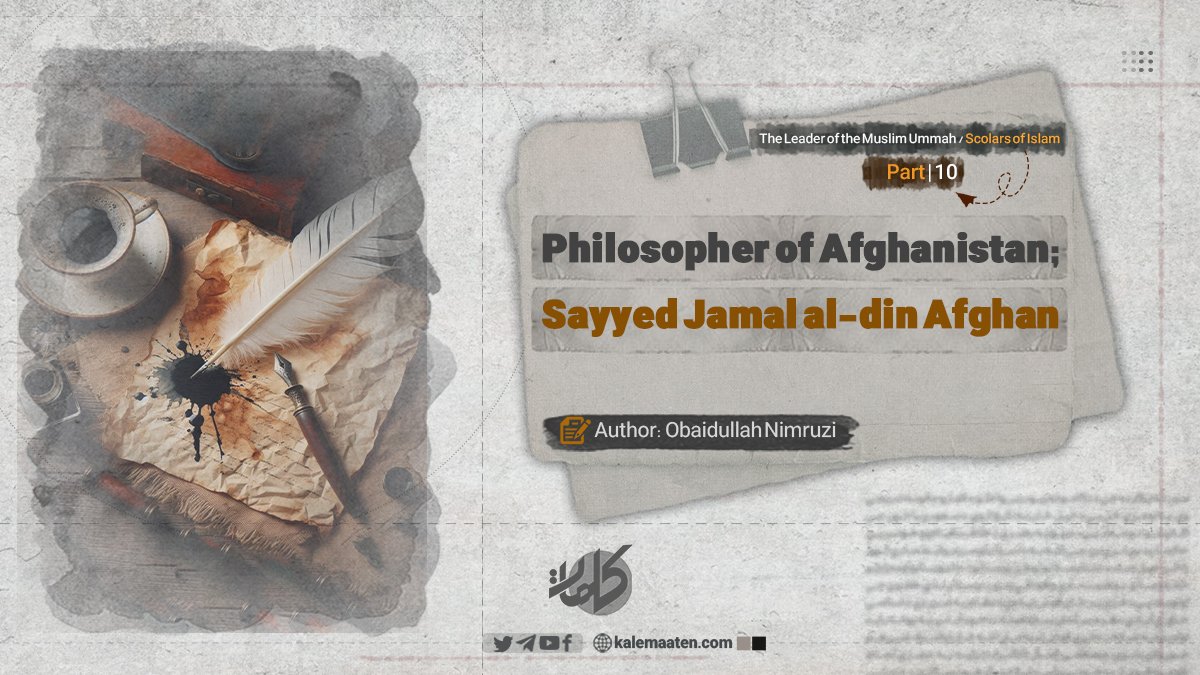
Author: Obaidullah Nimruzi
Philosopher of Afghanistan; Sayyed Jamal al-din Afghan (Part 10)
Sayyed Jamal al-din Afghan: The Pioneer of Freedom and Struggle
Sayyed Jamal al-din Afghan, known as one of the greatest figures in contemporary Islamic history, created a significant transformation in Islamic and political thought during his lifetime. He played an important role in the awakening and awareness of Muslims through his enlightening thoughts and struggles against colonialism and tyranny in the Islamic world. He believed that only through political and social freedom and by using science and knowledge could Islamic societies free themselves from the shackles of colonialism and tyranny. Here, we aim to analyze and examine his political and social thoughts and consider his political struggles that led to a transformation in Islamic politics and thought.
Sayyed Afghan’s Political Status and Thought
Sayyed Jamal al-din Afghan highlighted two fundamental and important issues in his political views, which together constitute the axis of his thoughts and struggles: first, the struggle to liberate the countries of the East from the domination of tyrannical governments; and second, the struggle to save these countries from foreign colonialism. These two axes played a key role not only in Sayyed Afghan’s political thoughts but also in his entire life and struggle activities.
During his various travels to different countries, Sayyed Jamal al-din observed the stark differences between the conditions of Eastern and Western societies. In the East, where most Islamic countries were located, he encountered poverty and backwardness, realizing that these countries were trapped under the shadow of tyranny and absolute rule. In contrast, in the West, he encountered advanced and flourishing societies that had achieved a high level of development and evolution in scientific, economic, and social terms.
During these travels, he concluded that the causes of the backwardness and decline of Eastern countries, especially Islamic countries, lay not only in their lack of access to science and knowledge but also in the domination of tyrannical rulers and political oppression. In Islamic societies, autocratic rulers who oppressed the people by force, combined with weaknesses in social and economic structures, hindered progress and development. On the other hand, Western countries achieved remarkable advancement due to the embrace of science and collective wisdom, along with the institutionalization of individual and social freedoms.
Sayyed Jamal al-din Afghan effectively analyzed these fundamental differences between Eastern and Western societies and asserted that the reason for these vast global gaps stemmed from the lack of scientific systems and individual freedoms in Islamic countries. In the West, people had been able to achieve political and social freedoms, and their governments were based on principles of reason and science. Conversely, people in the East were oppressed by tyrannical rulers and dictatorships.
The realization that in the West, science and freedom led to progress and prosperity, while in the East, ignorance and tyranny caused stagnation and degeneration, was the main focus of Sayyed Jamal al-din’s thoughts. He strongly emphasized the importance of freedom and science, viewing these as the primary tools for liberating Islamic societies from colonialism and tyranny.
Sayyed Jamal al-din also pointed out that in Western societies, people acted based on legal and humane principles to achieve their rights and did not submit to tyrannical rulers. In these societies, a spirit of courage and freedom-seeking prevailed, preventing any power from depriving people of their individual freedoms. For Sayyed, this served as a model for Islamic societies, which he aspired to cultivate.
In addition, Sayyed Jamal al-din emphasized the importance of social and economic institutions in Islamic societies. He believed that a free and advanced society should not only be governed by science and reason but that its economic and social structures should be designed to foster a better quality of life for its people. Thus, Sayyed Jamal al-din was also interested in economic and social reforms in Islamic societies.
Continues..



